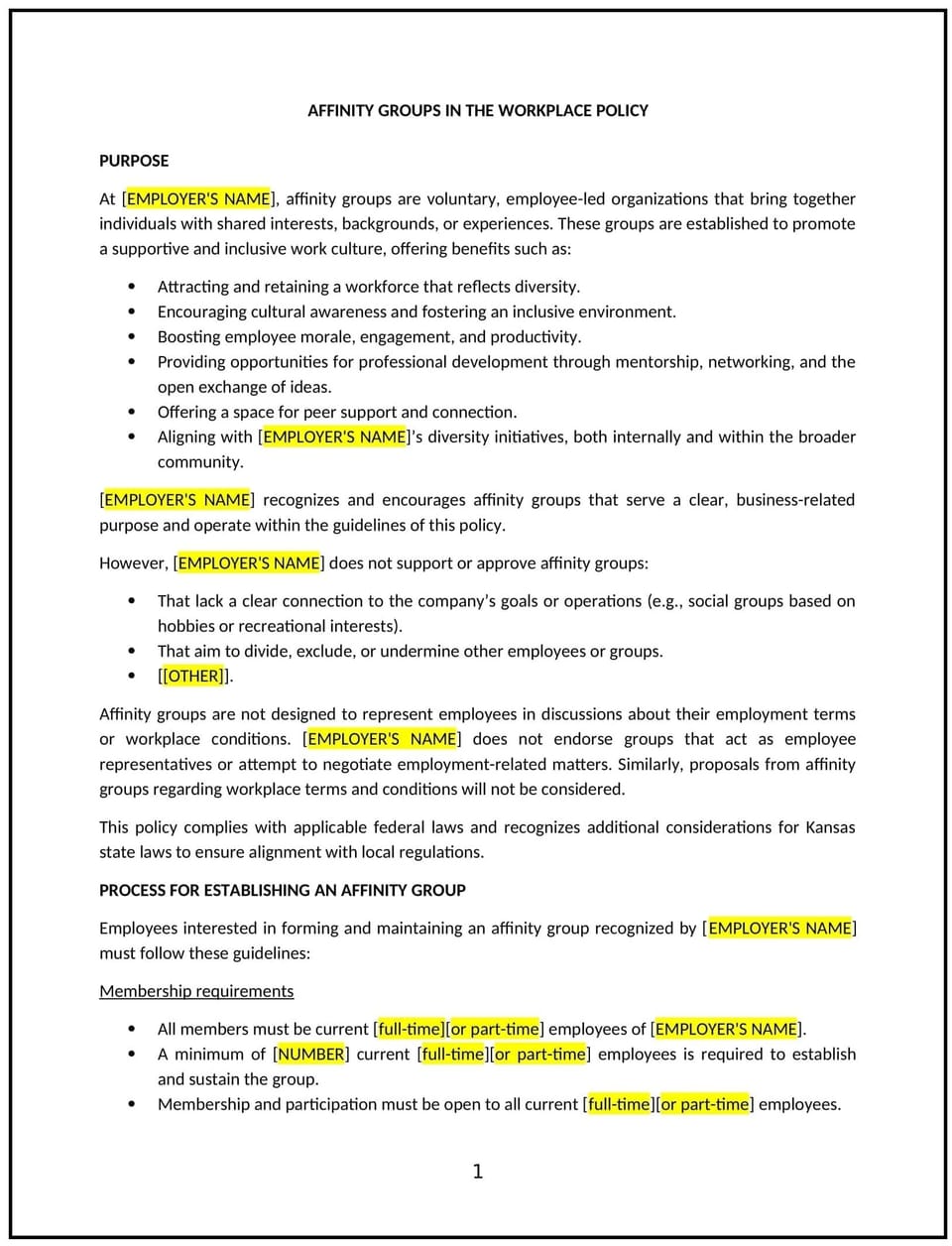Affinity groups in the workplace policy (Kansas): Free template

Affinity groups in the workplace policy (Kansas)
An affinity groups policy helps Kansas businesses establish guidelines for employee-led groups focused on shared interests, backgrounds, or identities. These groups foster workplace inclusion, collaboration, and professional development while aligning with company values and operational needs. A clear policy helps businesses structure affinity groups effectively while maintaining workplace cohesion.
By adopting this policy, businesses can support employee engagement, create a more inclusive culture, and encourage collaboration across teams while maintaining appropriate oversight.
How to use this affinity groups policy (Kansas)
- Define the purpose: Outline the role of affinity groups in promoting workplace inclusion, professional development, and collaboration. Businesses should specify the types of groups that can be formed and their alignment with company culture.
- Establish eligibility criteria: Clarify who can form and join affinity groups, ensuring an open and fair process. Businesses may require that groups be open to all employees and focused on shared workplace-related interests.
- Set governance guidelines: Specify how affinity groups should be structured, including leadership roles, meeting guidelines, and interaction with company leadership or HR.
- Outline participation expectations: Businesses should ensure that affinity groups maintain professionalism, inclusivity, and voluntary participation. Participation should not interfere with business operations or create conflicts.
- Address company support: Determine whether the business will provide resources such as meeting spaces, funding, or communication platforms while ensuring that support is distributed fairly.
- Implement reporting procedures: Businesses should establish how affinity groups report activities, request company support, and handle concerns or conflicts.
- Review and update regularly: Periodically assess the effectiveness of the policy and make adjustments based on employee feedback and company needs.
Benefits of using an affinity groups policy (Kansas)
- Enhances workplace inclusivity: Helps foster a supportive environment where employees feel valued and connected.
- Encourages collaboration: Allows employees to build relationships across departments, leading to stronger teamwork and innovation.
- Supports professional development: Provides networking and mentorship opportunities for employees with shared professional goals.
- Promotes employee engagement: Gives employees a platform to discuss shared interests, increasing job satisfaction and workplace morale.
- Maintains business alignment: Helps businesses structure affinity groups in a way that supports company culture and operational goals.
- Reduces potential conflicts: Establishes clear guidelines for how affinity groups operate within the workplace, preventing misunderstandings.
Tips for using this affinity groups policy (Kansas)
- Communicate the policy clearly: Employees should understand the purpose, structure, and expectations for affinity groups before forming or joining one.
- Provide oversight without interference: Businesses should support employee-led groups while maintaining clear boundaries to ensure alignment with workplace values.
- Encourage broad participation: While affinity groups often form around shared backgrounds, businesses should emphasize openness and inclusivity.
- Offer structured support: If providing resources, businesses should ensure that support is distributed fairly and aligns with company goals.
- Address concerns proactively: Establish a process for employees to raise concerns about affinity group activities while promoting open communication.
Q: Why should Kansas businesses implement an affinity groups policy?
A: Businesses should implement an affinity groups policy to promote an inclusive and engaging work environment. A structured approach ensures that affinity groups align with company values, support collaboration, and enhance employee engagement.
Q: What types of affinity groups should businesses allow?
A: Businesses should allow affinity groups that foster inclusion, professional development, or shared workplace-related interests. Groups should align with company values and operate in a way that benefits the broader workplace.
Q: How can businesses support affinity groups without creating favoritism?
A: Businesses should provide equal access to resources such as meeting spaces, internal communication platforms, and limited funding where appropriate. Clear guidelines ensure that all groups are treated fairly.
Q: Should businesses require oversight of affinity group activities?
A: Businesses should establish reasonable oversight to ensure that groups align with workplace values and do not interfere with operations. This may include requiring periodic reports, designating an HR contact, or setting general activity guidelines.
Q: Can affinity groups have external affiliations?
A: Businesses should determine whether affinity groups can affiliate with external organizations. If allowed, businesses should require groups to disclose affiliations and ensure that activities remain workplace-focused.
Q: How can businesses handle conflicts related to affinity groups?
A: Businesses should establish clear conflict resolution procedures, ensuring that all employees feel heard and that affinity groups operate in a way that supports workplace harmony.
Q: What steps should businesses take to review and update their affinity groups policy?
A: Businesses should periodically assess how affinity groups impact workplace culture and engagement. Updates should reflect company needs, employee feedback, and any changes in workplace structure.
This article contains general legal information and does not contain legal advice. Cobrief is not a law firm or a substitute for an attorney or law firm. The law is complex and changes often. For legal advice, please ask a lawyer.


